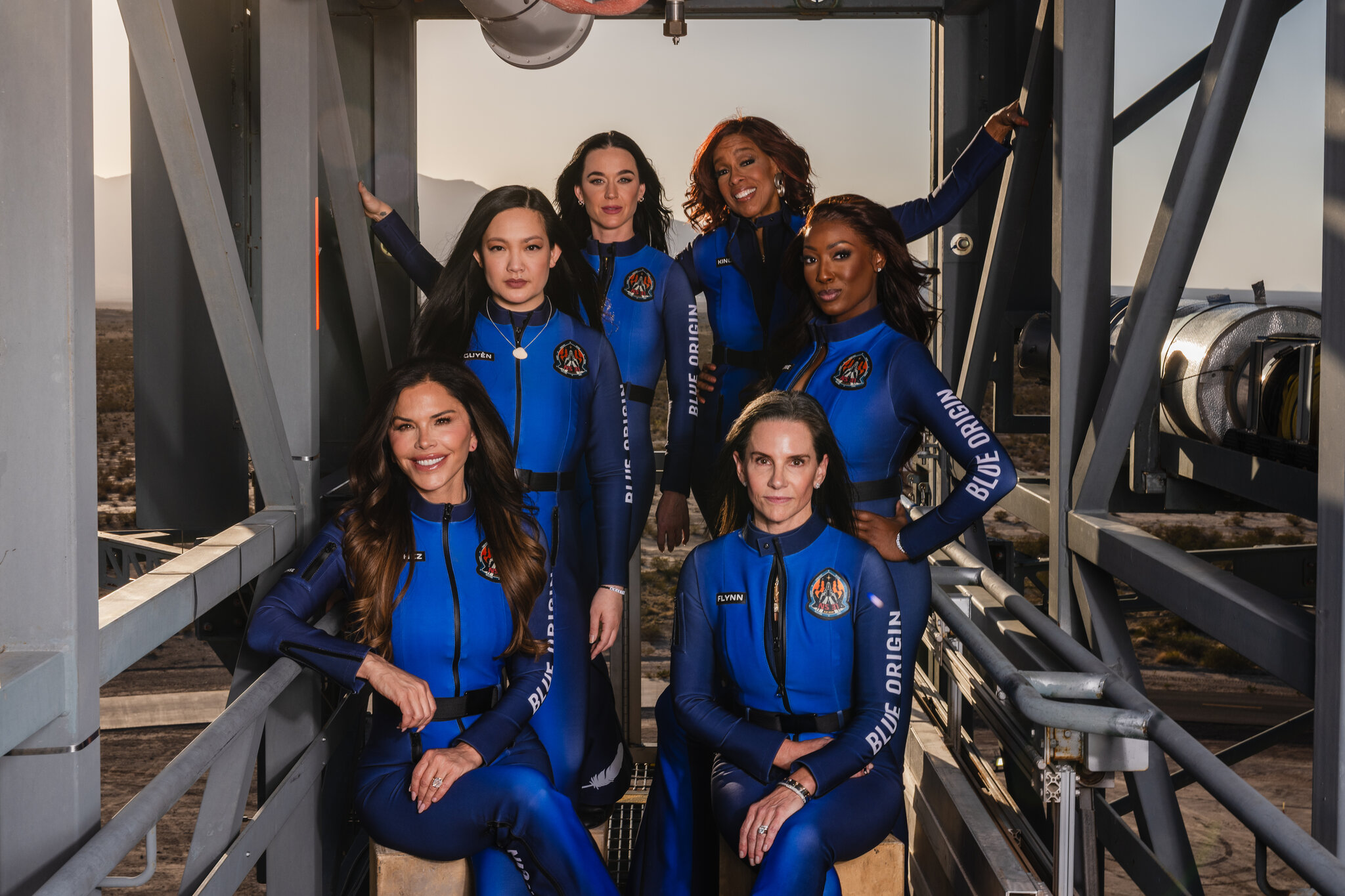Opinion: Do Not Be Distracted By Pop Stars, Space Rockets and “Cultural Greenwashing”

Although billionaire-funded space flights like Blue Origin’s are marketed as aspirational feats of progress, they function primarily as distractions from urgent social and environmental issues — reinforcing inequality under the guise of innovation.
The Carbon Cost of Aspiration
It has become apparent that the performative nature of the Blue Origin space trip was a carefully curated media event. It was a chance for an elite few (from Silicon Valley to Hollywood) to use such a moment as a platform for self-promotion, reframed under the guise of pioneers rather than profiteers. In the age of greenwashing, billionaire-funded “joyrides” to space are not revolutionary — they are reminders of everything broken with the world below. As wildfires rage, oceans rise and public trust in institutions erodes, the optics of celebrity space tourism feel increasingly out of touch. What was once the domain of scientific ambition has been transformed into a stage for luxury escapism — a playground for the ultra-wealthy, dressed in the language of progress.

It was Katy Perry’s demeanour in outer space that truly transformed the occasion into a glittering spectacle. Framed as a milestone in empowerment and the chance for much-needed female visibility in a male-dominated domain, the flight also seemed to be strategically timed to promote her upcoming tour setlist. Holding a single daisy in her hand and locking eyes with the camera, set against the backdrop of Earth’s curvature, the moment appeared highly staged. Upon landing from the 11-minute suborbital journey, she kissed the ground — an image that quickly circulated across media platforms. Furthermore, her public discourse — both before and after landing — struck many as out of touch, with her various interviews vaguely leaning on themes of unity and “love” while sidestepping the broader implications of what the group of six intended to achieve. There was little clarity on the purpose of the mission or the extent of the preparation and training (if any) required for participation.

Wrapped in what many described as a performative act of empowerment, it was branded as a “giant leap” — but for which cause exactly? Women in STEM? Of the six women who participated in the excursion (Lauren Sanchez, fiancée of Jeff Bezos; television anchor Gayle King; former NASA engineer Aisha Bowe; activist and scientist Amanda Nguyen; and producer Kerianne Flynn), only two had credentials even remotely aligned with the field. The rest were a mix of celebrities or media personalities. Meanwhile, qualified female astronauts around the world still face funding cuts, bureaucratic hurdles and limited mission slots — stark reminders that photo ops do not equate to real progress. In sustainability? The sustainability angle collapses under scrutiny. A single suborbital flight can emit anywhere between 75 to 300 tonnes of CO₂, more than the average person’s lifetime carbon footprint. These launches punch through the stratosphere, releasing black carbon directly into the upper atmosphere where it does the most damage.
One Step for Man, A Giant Leap Backwards for Mankind

In truth, Perry’s journey with Blue Origin was less about shattering glass ceilings than it was about choreography and PR theatrics. One would be remiss not to note that the launch happened in the week that the UK Supreme Court ruled against the rights of trans individuals to legally self-identify, offering a striking cultural contrast that saw elite figures ascend while many others are being systematically “grounded”. As millions reckon with ecological collapse, economic instability and institutional upheaval among social class structures, such performances feel like smoke and mirrors — aesthetic distractions masking systemic disrepair. From rising costs of living to the revelation that trillion-dollar companies like Amazon pay minimal taxes, the frustration is palpable. Against this backdrop, the idea that public subsidies and policy loopholes might help fund billionaire space fantasies — directly or indirectly — feels not just absurd, but deeply insulting.
This brings to mind the real cost of the Blue Origin trip: the carbon footprint, the symbolism and the precedent. Space tourism, as it currently stands, is a carbon-intensive indulgence masquerading as progress. It is reported that a single suborbital launch emits more CO₂ in minutes than the average human does in a year. When juxtaposed with widespread climate anxiety and the push for everyday citizens to cut back — ditching plastic straws, offsetting flights, going vegan — it becomes difficult to see these launches as anything but hypocrisy in motion.
Read More: Gen Z Extremism: How “Authenticity” Fuels Radical Views
Dawn of “Cultural Greenwashing”
There’s a term for this kind of contradiction — “cultural greenwashing”. It can be used to depict what happens when the language of sustainability, activism or inclusivity is appropriated to cloak business-as-usual. Perry’s flight aptly fits into this pattern. It presented itself as a feminist milestone but failed to materially advance the cause. In fact, it risked trivialising it, commodifying empowerment into a marketable image rather than a meaningful statement. Unfortunately, this is not new territory for Perry, who has long danced the line between empowerment and marketing. From controversial music videos slammed for playing into harmful tropes, to more recent attempts at reclamation that drew criticism for lacking substance, her public image has often been a battleground.
However, this is not about one individual — it is about the entire industry that enables, applauds and monetises these gestures. The growing space tourism sector — backed by figures like Jeff Bezos and Elon Musk — is less a new frontier of exploration than it is an elite playground. “Astronaut” — once reserved for pioneers and scientists — is now a status symbol available to those with enough money and PR muscle. It dilutes the significance of genuine progress in science and space innovation, replacing it with selfie-friendly excursions.
Read More: Opinion: Collective Consciousness is Not The Final Solution in Solving Global Issues
Almost exactly a year ago, the “Blockout Movement” gained momentum after TikTok influencer Haley Kalil posted a widely criticised video in which she lip-synced the phrase “let them eat cake” outside the Met Gala. The line, often (though inaccurately) attributed to Marie Antoinette, has come to symbolise elite disconnection from public suffering — a disconnection that ultimately sparked the French Revolution. As Al Jazeera noted at the time, the video struck a nerve because it coincided with the worsening starvation crisis in Gaza, where food insecurity has surged throughout the ongoing war.
Read More: Summer’s Hottest Seasonal Trend: Emotional Blackmail
More recently, Gayle King’s remarks about the Blue Origin spaceflight have begun drawing similar criticism. In a televised interview, King responded to backlash by saying, “Have you been to space? Go to space and let’s have a conversation” — a statement many perceived as dismissive of the concerns around privilege, access and the optics of space tourism at a time of widespread global instability. Rather than stepping back in the face of criticism, King’s doubling down only further highlighted how out of touch such responses can appear, further reinforcing the disconnect instead of addressing legitimate concerns the public might have. In an age where we as consumers are told to recycle more, travel less and do our bit for the Earth, watching an elite few burn tonnes of fuel to brush the edge of space — for 11 minutes of symbolism — feels like a slap. It is not inspiring, nor is it trailblazing. It is theatre and theatre alone cannot affect change if it does not acknowledge the root cause of rising inequality and public disillusionment.
All of this poses a crucial question: What exactly are we (as viewers with our feet firmly on the ground) celebrating when we cheer these launches? Is it the technological feat, the symbolism, or simply the escapism of it all? For most people, escape is not an option. As the climate temperatures rise, policies tighten and rights erode, the gap between those who can afford to flee and those who are left to face the consequences grows exponentially, highlighting a stark difference in societal and class structures. As Chinese tariffs shake global trade and factory insiders reveal “production secrets” behind the world’s top luxury brands, the veneer of ethical progress cracks further.

Beyond the carbon footprint and media spectacle, there could be a more insidious form of deflection at play. The Trump administration was well known for a tactic often referred to as “flooding the zone” or “chaos as a communication strategy”. It involves using a constant stream of newsworthy — often controversial or outrageous statements — tweets or policy moves to dominate the media cycle and distract from more serious or damaging issues happening simultaneously. Critics have pointed out that the timing and tone of the Blue Origin mission may serve as a strategic smokescreen, diverting attention from Amazon’s ongoing controversies, from labour exploitation and union-busting alongside the increasing level of immigrant surveillance and deportations by ICE. As calls mount to hold tech giants accountable for their role in systemic injustice, trips like these allow their billionaire figureheads to pivot public discourse — rebranding themselves not as corporate actors complicit in harm, but as visionaries looking toward the stars.
For more on the latest in opinion pieces and culture reads, click here.
The post Opinion: Do Not Be Distracted By Pop Stars, Space Rockets and “Cultural Greenwashing” appeared first on LUXUO.






